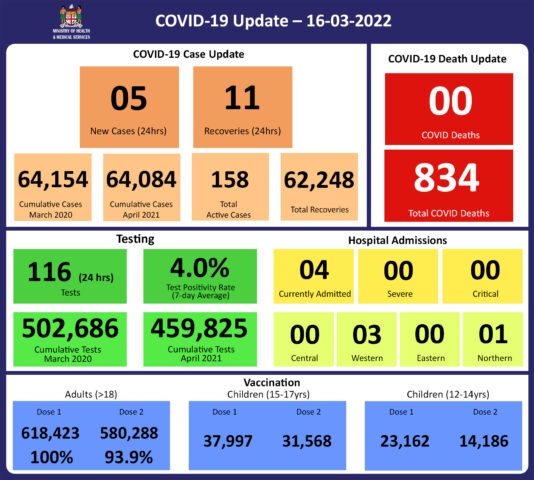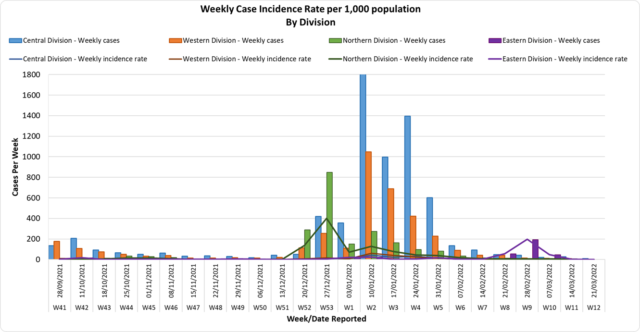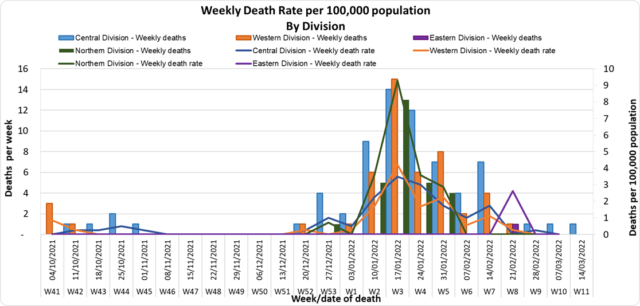COVID-19 Update 16-03-2022
COVID-19 Update
Wednesday 16th March
Public Advisory:
COVID-19 Vaccination
As of 16th March, a total of 112,295 individuals have so far received booster doses. Members of the public are advised to obtain their booster dose after at least 5 months from their second COVID-19 vaccine dose. Moderna vaccine and Pfizer vaccines are both available for adult booster doses.
Our vaccination efforts in children are currently progressing well. We have reported that the estimated numbers of adults (i.e. people aged 18 and over) that we wanted to vaccinate have been achieved, however as these were estimates, we expect that there will be pockets of unvaccinated adult individuals. We’re extremely proud to have achieved such high coverage but our operational focus is on the larger target population of people aged 12 years and above. Our 2 dose vaccination coverage of our entire vaccine eligible population (all persons 12 years old and beyond) is 87%. The impact of our vaccination program has been clearly demonstrated by the fact that case numbers and severe disease outcomes were significantly mitigated in the West during the second wave (Delta), and the higher vaccination rates contributed significantly to this. Furthermore, the health impact of the last wave (Omicron) was mitigated by our collective engagement in Vaccineplus measures. Our borders were opened safely because of the high level of protection we built up together.
Our current booster program has been slowed down by slower uptake and deployment difficulties related to competing priorities in dealing with the surge of leptospirosis, typhoid, dengue fever, and influenza. The public is reminded of the need to get booster vaccine doses, and the list of vaccination sites is provided daily on the MOH webpage. The current situation is that we expect decreasing immunity from the 2 doses of vaccines and possibly decreasing post-infection acquired immunity. COVID is endemic in Fiji, as it is in most of the world, which basically means it is always present. We are also open to international travel while Europe, China, New Zealand, and Australia are experiencing surges in COVID cases. We need people to get a booster dose so we can reduce the risk of future surges in COVID 19 in terms of severe disease and hospitalisation, and severe public health measures.
We will continue to monitor the evidence on post-infection immunity based on quality data that is being generated globally. However, until we have a better sense of the role of post-infection immunity, the Ministry of Health will continue to define our level of protection based on vaccination numbers
Given the current stocks of Pfizer vaccine we have, we will be using Pfizer for the ongoing primary 2 dose schedule of children and adults and as the booster dose.
Influenza
The surge in influenza cases has caused a severe strain on outpatient care capacity. We are still seeing a high number of LTDD cases while also continuing our efforts to support COVID-19 vaccination needs. These factors together only increase the pressure on all healthcare services, especially our outpatient facilities.
Before the pandemic, Fiji’s influenza season typically began in January and ended by May/June. However, in 2020 and 2021 there was a marked decrease in cases of influenza detected, a trend that was also seen in other countries. It is likely that public health and social measures deployed for COVID-19 worked to decrease other respiratory viruses, including influenza. The current increase in cases suggests a return to pre-pandemic levels of seasonal influenza, however, it is also possible that decreased incidence of influenza in recent years will have led to decreased immunity in the community, and subsequently more people becoming ill than in a usual flu season.
Children under the age of 5 (especially babies) and the elderly are most at risk of severe influenza.
We have published advisories on how to care for oneself and children with flu, and what symptoms to be on the watch out for especially as related to seeking extra care (https://www.health.gov.fj/influenza/).
The Ministry has been working on measures to open more facilities with extended service hours and streamline outpatient services to help reduce waiting times. We have recently seen the return of many of our staff from annual leave that had been deferred during the second and third waves of COVID-19, as well as sick leave during this increase in flu. We have also made adjustments in our outreach programs to deal with LTDD, and vaccination needs, in order to free up staff for outpatients services in health centres to help improve services.
Leptospirosis, typhoid, and dengue fever
As previously mentioned, the recent weather has resulted in conditions conducive to outbreaks of leptospirosis, typhoid, and dengue fever, which are climate-sensitive diseases endemic to Fiji. Though we have noted a decrease in hospital admissions, we are also aware of continued heavy rain in parts of the country, particularly the Western Division, and our experience has been that leptospirosis cases, hospitalizations, and deaths increase following similar weather events. As such the medical advice we provide needs to be followed, while we continue to mount our public health and clinical response. Please heed our advice to protect yourselves and your loved ones
Prevention
The leptospirosis bacteria is spread to humans through the urine of infected animals, such as cows, pigs, rats, and dogs. To reduce your individual risk, it is important to understand that exposure to animals, soil, mud, and floodwaters during work or recreational activities increases your risk of infection.
Important prevention measures include wearing full covered footwear at all times when going outdoors, avoiding wading or swimming in flooded waters, using clean fresh water to wash up after exposure to muddy waters, and keeping all food and drinks covered and away from rats. For workplaces, practice good personal hygiene at all times, cover cuts and wounds well, and use protective equipment, especially footwear when in flooded and/or muddy areas.
We are also urging all parents and guardians to prevent children from playing in the mud or swimming in flooded rivers or creeks, and ensure that they wear shoes when outside.
Symptoms and treatment
Early treatment can decrease the severity and duration of the disease. Please seek medical care if you have recently had contact with floodwaters, mud, or animals, and develop the following symptoms: fever, muscle pain, headache. You may also have red eyes, loss of appetite, nausea/vomiting, dizziness, or feel weak.
Leptospirosis can be treated with appropriate antibiotic medications prescribed by a doctor if treatment is sought early. Danger signs for severe leptospirosis include shortness of breath, coughing blood, chest pain, yellow eyes/skin (jaundice), signs of bleeding (including unexplained bruising), decreased or increased urination, difficulty staying awake. Severe leptospirosis is life-threatening, and anyone with these symptoms must be taken to the hospital immediately.
Typhoid fever
Typhoid fever is typically found in areas that do not have access to proper toilet facilities and/or clean drinking water. We strongly encourage people who live in rural areas, informal urban areas, and any other areas where access to clean drinking water is limited, to boil all drinking water. We must all also continue to practice basic hygiene measures such as frequently washing hands with soap and water, especially after visiting the toilet and before eating or preparing food.
Dengue fever
We continue to urge everyone to get rid of potential mosquito breeding places, such as empty containers inside and outside your homes that may collect water, including discarded tires, flower vases, and pot plant bases. Protect yourself from being bitten by mosquitoes by using mosquito screens in your homes, and mosquito repellents.
Last Updated on 2 years by Publishing Team



